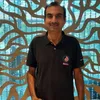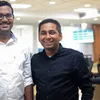How Bengaluru-based startup Meldoc acts as a virtual personal assistant for doctors
Founded in 2018 by Dr Rajesh Pothugunta, MelDoc functions as a virtual personal assistant for doctors, and lets them connect, work smart, upskill, and stay on top of investments.
Long hours of work, little time for family and personal interests, and next to no time for themselves. A doctor’s life isn’t easy, but Bengaluru-based startup MelDoc aims to change that.
Built by a physician for physicians, MelDoc is a doctor's "virtual personal assistant” that lets him or her connect, work smart, and upskill.
It also offers services such as automated appointment systems, document storage in the cloud, and reminders for savings and insurance premium payments.

MelDoc Founder Rajesh.Pothugunta wants his platform to help simplify a doctor's life,
India has one doctor for every 1,457 people as per the country's current population estimate of 1.35 billion. More than 11.57 lakh allopathic doctors are registered with state medical councils and the Medical Council of India as on January 31, 2019.
MelDoc Founder Rajesh Pothugunta believes that as the pool of doctors grows, technology can play a major role in “changing their lives for the better”.
How it all began
Rajesh, 39, worked as an orthopaedic surgeon at Vydehi Institute of Medical Sciences and Research Centre in Bengaluru for more than a decade. He passed out of M S Ramiah Medical College, Bengaluru, in 2008 and completed his post-graduation at Vydehi Medical College in 2011.
Over time, he realised that he was overworked and had not really planned his life. He had earnings, but no idea on where to invest, train, and collaborate.
“I saw so many startups mushrooming. Startups to create an EMR for hospitals, startups to fix doctor appointments…but there was nothing that managed their time, money, reskilling, and collaboration. I decided to create a super assistant as the ecosystem already existed,” he says.
In 2017, he conceptualised MelDoc, a personal assistant for doctors. He invested Rs 1 crore of his own money to build the platform.
“I am not an engineer and intitially I decided to build the platform outside. But I realised I could never get freelancers to understand the idea behind the product. I then began to hire engineers in the company,” Rajesh says.
He says his brief was simple: to build a personal assistant that could simplify and enhance a doctor’s busy life.
Initially, Rajesh “stumbled” with the product. But by 2018, the platform was ready for a proof of concept.
How the virtual assistant works
All a doctor has to do is download the app, register, and start “inputing” their schedule data. It allows the doctor to collaborate with doctors in other regions based on the MelDoc network. So, a general surgeon in Kanpur can connect with a Delhi-based super specialist to discuss the merits of a case and further assessments to help a patient.
The platform also offers online courses from various certifying bodies, allowing doctors to participate in live lectures and surgeries.
MelDoc doubles up as a platform for insurance and mutual fund companies, suggesting saving or investment products. It also works as a storage platform, allowing doctors to upload and save documents in the cloud.
“The assistant is automated and helps the doctor to take control. It offers collaborative experiences along with investment/saving options,” Rajesh says.
The founder believes that the personal assistant can prevent doctors from being sued because “everything from patient history to treatment schedules to education history” is preserved in the app.
Rajesh currently has PoCs at five hospitals, but did not want to disclose names. He is bound by silence under NDAs, and is also awaiting MCI clearance as the app for doctors will have a lot of information that must be “secured and encrypted”.
The way ahead
The startup, which has a four-member team, has on-boarded close to 1,000 doctors. The founder says he needs 10,000 doctors to break even.
“I have grown organically and have not aggressively pursued marketing,” Rajesh says.
MelDoc competes with DocsApp, , and , but Rajesh says his offering is unique because “it picks off where the competition stops”.
The startup feels that it can be a “layer” on top of the other apps, and help doctors stay on track with their medical appointments and personal goals.
Rajesh aims to tie up with insurance companies going forward. He is also actively working on adding medical literature on to the app for reskilling. He is scouting for a $3 million investment to scale the platform.
“In the future, we will be a data play as we will know what doctors want. We will take commissions from our education and insurance products, and also charge doctors a subscription fee,” Rajesh says.
(Edited by Teja Lele Desai)



![[Startup Bharat] Vadodara-based I Online Doctor is making healthcare accessible to patients beyond metros](https://images.yourstory.com/cs/2/3fb20ae02dc911e9af58c17e6cc3d915/startuplogo-1580298885323.png?fm=png&auto=format&h=100&w=100&crop=entropy&fit=crop)






